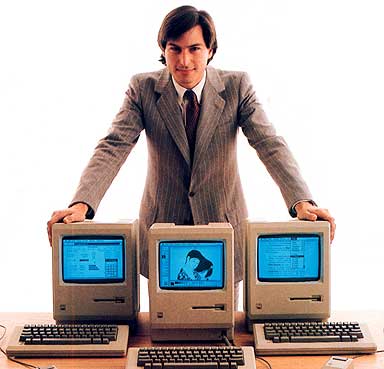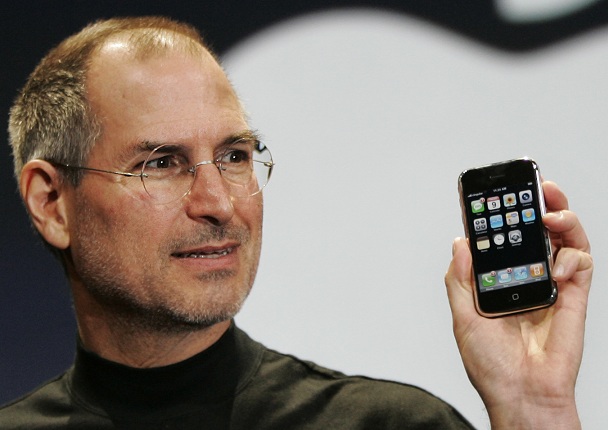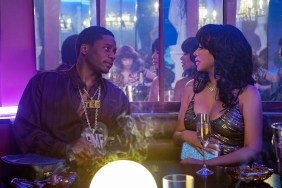I felt like, as a gamer, I needed to write up something regarding either Steve Jobs or Apple. The news of Jobs' passing hit me surprisingly hard; I was never a big PC gamer (or a Mac gamer, to be completely clear), but like many young students, I did have experience with one classic computer game that sold Macs to schools across the country: The Oregon Trail.
For anyone who doesn't remember (or might simply be too young to have had the experience), the Oregon Trail and its various incarnations over the past 30 years put players in the role of a leader of a cover wagon group trying to work their way across the treacherous—you guessed it—Oregon trail. Along the way you have to ration supplies, repair damaged wagons, and even hunt for food to keep the caravan moving. As the leader, you make decisions that impact your entire pack: how much they can eat, how much they need to pull, and if anything goes wrong, they turn to you for guidance. People die, supplies disappear, and all manner of terrible things can happen—the favorite being "YOUR PARTY HAS DIED OF DYSENTERY".
Why do I bring this up? Because Apple products—to this day—have a reputation for not having any games. They're usually an audio/video/editing powerhouse, but not great for play. But what's amazing is that the genesis of the company came from the video game world. Before Apple was even a company, Steve Jobs worked as a technician at Atari, the fastest-growing company in US history up to that point. He and his best friend, Steve Wozniak, poked and prodded at possibilities, with the story being that they stripped 50 chips out of the circuit board for the game Breakout and were given money for each chip removed… to the tune of $5,000 (though he only told Woz about an offer of $700 and "shared" half of the earned cash).

After Jobs was ousted from Apple in the early 1980s, Apple's product line was splintered and seemed to focus more on the business and business-minded consumer markets. Sure, there were games released for Macs, but with Apple's desire to hold so tightly to what went on their hardware (akin to the Nintendo Seal of Quality through the same era) meant that free development wasn't much of an option. There was a community that did it anyway (like any other similar scenario), but the development wasn't anywhere near what happened on the PC. The end result was unfocused on all fronts.
Specifically to video gaming instead of computer gaming, Apple did beat Microsoft to the punch with one other device: the Pippin. Marketed in the US as the BANDAI Pippin, it was essentially a PowerMac stripped down a bit, pushed into a big disc drive case, and had a few controller ports glued to the front. Even if that's an exaggeration, it still sold about as well; it spent fewer than six months on store shelves in the US. It didn't help that it was launched late in the first post-Jobs era when everything seemed to be going wrong and profits were sliding.

He came back in 1997, and everything took a U-turn. After his return, the product line was trimmed to the essentials and Jobs grabbed what was there by the throat. And, after his return, gaming started to seep its way back into the Apple lifestyle in the public view. If you still think today that games aren't available for your Mac, then I ask you to simply bring up the iTunes store and browse the apps available to you. Not only did the Apple/Jobs combination successfully bring a new platform with which to play games (notably on the iPod Touch, iPhone, and iPad) but an entirely new paying structure. So many games, so many genres, for so cheap and in such a beautiful, accessible fashion. For the most slick, top-of-the-line design in computers, the iTunes selection of both free and minimal-cost games is massive. Angry Birds FTW!
And that journey seems to work right along with how the Oregon Trail game did. Things started out pretty strong, then got pretty low there (sorry, any Newton fanboys), and in the final stretch, everything looks to have turned out all right. In arguably the greatest turn-around in business history, Jobs brought the struggling company he helped create from the garage back to profitability and in the process had us all find a few birds to throw. While he may not have brought us Gears of War or Halo (though the Halo team did bring Marathon—an amazing FPS in its own right—to the world), he did exactly what he wanted. He brought the games to the masses in entirely his own way. Can't really argue with that.
Thanks, Mr. Jobs. From one gamer to another, I'd say you've done us proud.







